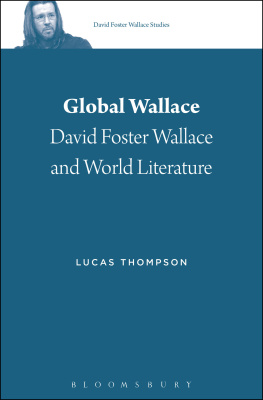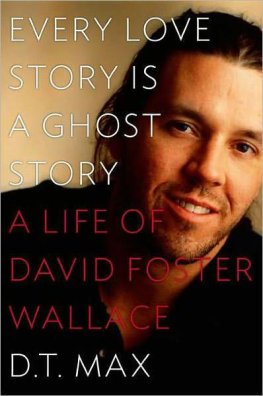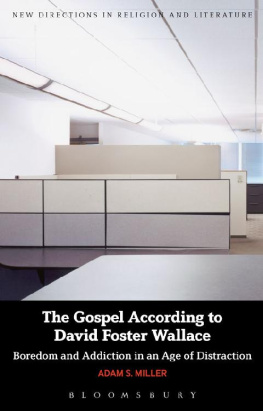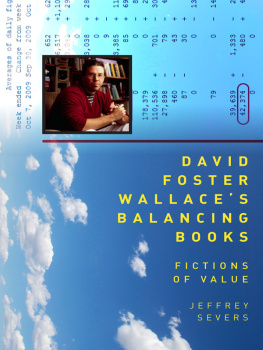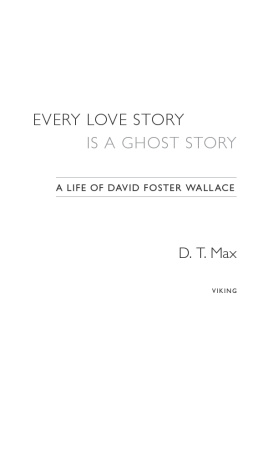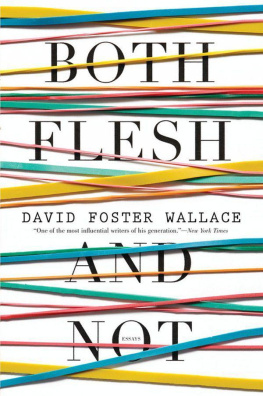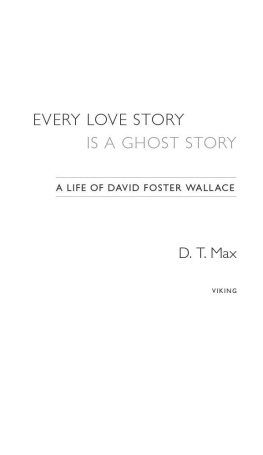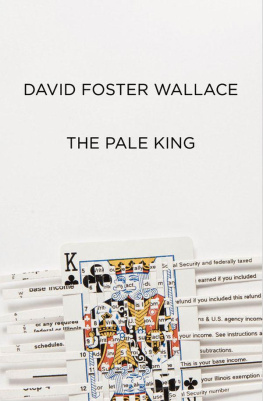David Foster Wallace Studies
Vol. 1
Series Editor
Stephen J. Burn, University of Glasgow, UK
Advisory Board
Kasia Boddy, University of Cambridge, UK
Marshall Boswell, Rhodes College, USA
Paul Giles, University of Sydney, Australia
Charles B. Harris, Illinois State University, USA
Luc Herman, University of Antwerp, Belgium
Steven Moore, Independent Scholar, USA
for Catherine

Contents
Lucas Thompsons Global Wallace is the first volume in Bloomsburys new series, David Foster Wallace Studies. The series is driven by the belief that the exponential growth in interest in Wallaces work during recent years necessitates a corresponding evolution in the way we think about Wallaces writing. It is no longer necessary to make a case for Wallaces worthiness as a subject of scholarly attention when, as Jonathan Franzen notes, a literary establishment that had never so much as short-listed one of his books for a national prize [has] now united to declare him a lost national treasure. This series attempts to facilitate that movement by publishing volumes that find a way to alter the horizons of Wallace scholarship. The focus of some of these volumes will be Wallace-intensive, taking as their goal the need to develop new perspectives on the now extant body of Wallaces work; others will respond to the particularly urgent need to see Wallace in context, putting his work back into its vibrant literary, social, and cultural context. Whether re-formulating the axioms of Wallace criticism, bringing his work into dialogue with unexplored theoretical models, or remapping the coordinates that govern our understanding of contemporary fiction, the series will emphasize work that does not re-invent the wheel, but builds on earlier scholarship in an effort to genuinely advance Wallace studies.
Wallace criticism really begins in the early 1990s, though with few exceptions, and it is important not to oversimplify its variety. Some of the most innovative recent approaches, for instance, manage to convincingly read Wallaces work through unexpected dialogues with numismatics (Jeffrey Severs), approaches to the infowhelm (Heather Houser), and institutional frameworks (Mark McGurl). Neverthelessand with that caveat in mindit is possible to trace some of the fields most persistent preoccupations.
Perhaps the first lesson we learn when looking back on the extant body of Wallace scholarship is that to write about Wallace for many critics is to write about the mechanics of literary influence. For good reasons, Wallace scholarship has carried on a kind of stereoscopic project, where the Wallace text under investigation is read in parallel with some antecedent work that is laid alongside it. This approach was inaugurated by LeClairs pioneering reading of Infinite Jest as the work of a Pynchon protg, Even where more cosmopolitan traditions are envisaged, overseas writers (most often Dostoevsky) tend to be normalized to fit within a narrow American trajectory.
Neither trend is entirely aberrant. Reading Wallace in stereoscopic fashion has persisted, in part, because it responds to a real dimension of Wallaces artistic practice. Equally, properly rigorous accounts of Wallaces specifically American literary ancestrysuch as Charles B. Harriss exemplary reading of Wallaces relation to Barthdeepen our understanding of the writers national reference points. These two approaches, then, have provided what we might think of as the generative axioms for some of the best Wallace scholarship to date, yet at the same time these axioms also mark the explanatory horizons of this approach to understanding of Wallaces writing. It may be, for instance, that Wallaces intertextual compositional process typically requires an appeal to an ancillary text, yet it has been rare for critics to formalize their discussion of Wallaces patch writing into a larger model of cultural transmission. Equally, while we need to better understand Wallaces American engagements, we need to do so without effacing, for instance, his fascination with Latin American writers, which stems back at least as far as his seminal exposure to the Boom writers in Andrew Parkers classes at Amherst.
Part of the significance of Lucas Thompsons monograph precisely lies in its axial reconsideration of these elements of Wallace studies. In addressing Wallaces varied revisionary strategies, Thompson engages with and critiques received models for cultural transmissionnotably Harold Blooms map of enigmatic patterns between poetswhile he also formulates Wallaces conception of literary influence in fluid terms that move across a sequence of different analogies (the programmer, the holograph and so on) as the writers career progressed. This framework allows him to offer a pioneering challenge to the orthodox view of Wallaces American genealogy, which is replaced by the most expansive map to date of Wallaces eclectic reading. The familiar white male core of US postmodernism is convincingly supplemented by both much richer accounts of literary ancestors that have been (in some cases) only partially acknowledged (from Dostoevsky, through Kafka, to Walker Percy), and by a sequence of unexpected names (from Jean Rhys to Jamaica Kincaid). Thompsons approach is simultaneously centrifugalreaching out from Wallaces texts to connect his writing to larger currents in World Literary studiesand centripetalprobing into the core of Wallaces working procedures, especially as they are revealed by his archival materials. In this latter respect, Thompson seems to me to have examined the Harry Ransom Centers archive of Wallaces paper in more detail than any other critic, and I find it hard to imagine a serious Wallace reader who will not learn something new about Wallaces work from these pages. Indeed, while D.T. Maxs indispensable Every Love Story is a Ghost Story (2012) has provided us with the most extensive account of Wallaces life that we currently have, it necessarily did so in the typical mode of biography that privileges the suffering man over the story of books such as Oblivion; Thompsons volume might, on one level, be thought of as the counterpoint to Maxs project, inasmuch as its exhaustive archival dimension restores the biography of the books.
There is still significant critical work to be done on Wallaces American genealogy, and perhaps such research might begin by trying to think beyond the novel. For all the references Wallace made to Louise Glck and other poets, for example, scholars have rarely explored the importance of poetry to his work. Similarly, while Wallace described reading Donald Barthelmes The Balloon as a seminal moment in his growth as a writer, with few exceptions (notable, albeit brief, comparisons by Mary K. Holland and Lee Konstantinou), the duration of his relevance to Wallaces growth has rarely been discussed. How might the combination of adult and childlike perspectives in Me and Miss Mandible map onto The Soul is Not a Smithy? How does Barthelmes use of just one side of an interview (the questioners) for part of Kierkegaard Unfair to Schlegel relate to Wallaces own interview-based narration? In somewhat larger terms, Wallaces place within writer networks might also merit investigation, especially in relation to Somerville, Massachusetts, where Wallace, Franzen, and Richard Powers all lived in the 1980s. Yet, as Thompson persuasively shows, this is only one part of Wallaces story, and his fictions scope needs to be rethought beyond national boundaries.
Global Wallace is, in my view, a fitting volume to open this series both because of the way it enlarges our previously narrow understanding of Wallaces contexts, and because of the rigor and quality of its insights. Those insights open up new avenues for investigationI find myself wondering, for instance, how Wallaces interest in Craig Raines

